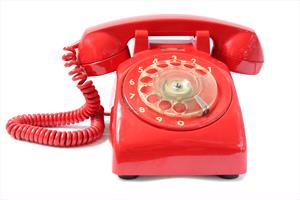Red rotary phone

Photo courtesy of Depositphotos
One thing that’s always amazed me is the difference between how my doctor communicates with me and how I communicate with my clients. I like to think, in general, that veterinarians communicate better than their human medicine counterparts, and I know this viewpoint has been shaped by my personal experience.
Before or after I go in to see my healthcare provider, most of the communication occurs through an online portal. I can ask questions, and usually get a short reply within 48 hours or so. I know that modern healthcare has greatly expanded how many patients a doctor is supposed to see, and that the “human touch” aspect of human medicine is now as quaint as a phonograph or the Pony Express, but communicating through a computer just feels...cold. Cold and impersonal. My doctors have always been nice during the office visit, in a rushed sort of way, but the stuff that comes after seems a tad empty.
Compared to the amorphous behemoth that human medicine has become, veterinary medicine usually has a closer, more personal link between the doctor and the client. In short, veterinarians rely on keeping clients happy to succeed whereas human doctors rely on insurance companies. In both cases, the health of the patient fits into the equation and is the obvious end goal, but I don’t think it’s the driving force in human medicine. I don’t think most veterinary clients would be satisfied with the level of contact that I describe above for my healthcare, and this brings up an important point.
My officemate at one hospital would spend hours on the phone with clients, keeping her well past the end of her day. She managed complex cases, and like most internists, was a bit of a perfectionist. There are days when I wondered how she managed to stay sane while living on the telephone. It seemed to me that there should be a happy medium, one that allowed my officemate to not work long past the end of her day, yet communicate clearly to her clients about their beloved pets.
Every veterinarian has solved this problem in their own individual way. Some veterinarians charge a fee to call clients, some consider it a part of doing business, and yet others charge a fee for calling only when their time is being abused by a client. Some veterinarians have their technicians make calls, especially when they are conveying normal results.
Of course, it’s not just about the doctor’s time – it’s also about your equally valuable time. Plus, you are the one on pins and needles waiting for results, and not wasting time on phone tag is important to you because Buster is looking at you with those beseeching eyes, hoping to snarf excess treats while you’re worried.
It is important that you ask how your veterinarian will be contacting you when needed. Will they call, text or email? You can help reduce the time involved in playing phone tag – and your frustration in playing it - by providing as much information as you can when you are at the office or when you first leave a message. When leaving a phone message, be sure to speak a bit more slowly than usual, leave the most basic information first: your name and number. Then mention what you are calling about, the best times for call backs, when you will call again if you will be unavailable, or state that you have sent additional information via email or a text. Anything you cando to speed up communication is helpful, unless you are going at Wile E. Coyote speed, in which case the breakneck speed may inadvertently slow you down because no one on the receiving end can understand what you’re saying.
Some practices accept texts, which is the most convenient communication for some clients, but not all can do it. Some veterinarians carry company cell phones. Ask your clinic if their business line is text-enabled before you text. If your veterinarian offers to text, program your phone with the clinic’s number so that when you text, the clinic will immediately know who it’s from. Texting can eliminate a lot of phone tag, but you have to know if the clinic or hospital can accept them.
Don’t forget that even in this day and age, some people still use cell phones that do not accept texts. Yes, that’s true – not everyone keeps their cell phone glued to their body 24/7, and I know some of them. (They seem like otherwise pretty normal people.) Many elderly people do not use cells, either. Tell your veterinarian if you cannot get texts.
However you and your veterinarian communicate with each other, it helps everyone to be concise yet informative when the Game of Phones begins.